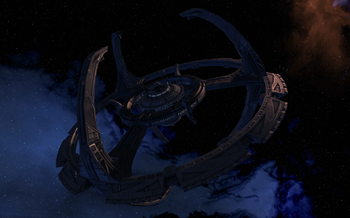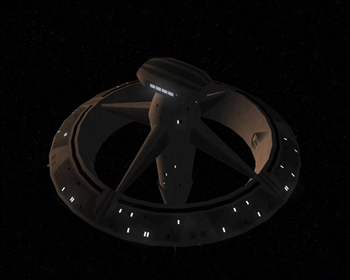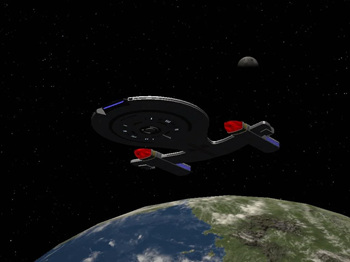Forward Observation Zone Gamma
Created by Commodore Wilkan Targaryen on Sat Feb 24th, 2024 @ 10:37pm
Forward Observation Zone Gamma
Forward Observation Zone Gamma is a United Federation of Planets Starfleet installation located adjacent to the Gamma Quadrant terminus of the Bajoran Wormhole.
Overview
A Starfleet installation established in the Gamma Quadrant, Forward Observation Zone Gamma was constructed in 2410 to help promote stronger relations between the Dominion and the United Federation of Planets. Consisting of an outpost, defensive structures, medical support, and other logistical facilities, Forward Observation Zone Gamma's primary responsibility may be to serve as a diplomatic center, but the installation has the added purpose of supporting Starfleet's strategic and tactical objectives should the Dominion become a threat.Initial work on what would become Forward Observation Zone Gamma began in 2370 when Starfleet attempted to deploy communications relays in the Gamma Quadrant to allow realtime communications with the Alpha Quadrant. Early communications through the wormhole were possible; however, they were unreliable and required the wormhole to be open to be successful and were prone to interference. It was not until first contact with the Dominion that significant resources were focused on the project so that Dominion activity could be monitored. Through the historic first joint Federation-Bajoran-Cardassian effort under the new peace treaty, work began on the "Wormhole Comm Relay Project" to create a Gamma Quadrant relay station to aid communications between the two quadrants. A signaling satellite was positioned at the Bajoran end of the wormhole and a relay station on the Gamma Quadrant side. While early tests failed, one test caused a reaction in the wormhole that pulled a nearby comet onto a collision course with the wormhole. Efforts to destroy the comet were made, resulting in an Obsidian Order plot to disrupt the treat being exposed, but the comet inadvertently released silithium and created a subspace filament that allowed the wormhole relay station to work. The relay station would allow real-time communication with the Alpha Quadrant for several years before being destroyed by the Dominion.
Efforts to reestablish the Wormhole Relay Station were made following the conclusion of the Dominion War, with several members of the Federation Council wanting a permanent Starfleet defensive presence in the Gamma Quadrant as a result of the war. Starfleet Command drafted the first proposal for Forward Observation Zone Gamma in response to these directives. The plan would call for a fortified outpost with a locked entry and exit point to help protect the Bajoran Wormhole from the Dominion. Operational support for the Forward Observation Zone would be provided by Deep Space Nine, allowing for improved reaction time in the event of Dominion threat. The Federation Council voted down the proposal, not wanting to antagonize the Dominion, but Starfleet Command did keep the proposal on file for the future.
Following renewed contact with the Dominion in 2410, the United Federation of Planets and the Dominion agreed to a limited Starfleet installation in the Gamma Quadrant. While a lasting peace could not be established in this instance, Forward Observation Zone Gamma would be the start of a stronger relationship.
Infrastructure
Deep Space 47
 | |
| Affiliation: | Federation Starfleet Cardassian Union (Former) |
| Class: | Nor |
| Service Period: | 24th - 25th Centuries |
| Diameter: | 1,451 meters |
| Height: | 969 meters |
| Decks: | 260 |
| Mass: | 45,000,000 metric tons |
| Crew: | 500 personnel 7,000 evacuation |
| Armament: | Spiral-Wave Disruptors Torpedo Launchers |
| Auxiliary craft: | Garrison Ship Starfleet Runabouts Starfleet Shuttlecraft |
History
Constructed between 2344 and 2349 to serve as a refinery for uridium ore mined in the Trivas system, Empok Nor was built under direction from Cardassian leader Kotan Darek and was intended to accommodate up to 7,000 workers and to process 20,000 tons of ore a day. The Cardassians chose to abandon the station, leaving behind standard booby traps that targeted non-Cardassians, citing the Klingon Empire's invasion of the Cardassian Union in 2372. This was, however, merely a cover story as the station had been the site of a failed experiment that used psychotropic drugs to enhance the Cardassians' natural xenophobia to enhance their combat effectiveness. While the test subjects were recovered, the Central Command chose to leave them on the station.In late 2373, a Starfleet away team from Deep Space 9 traveled to Empok Nor to salvage spare parts due to multiple technical failures on DS9. During the mission, the test subjects were accidentally released and systematically hunted the Starfleet away team before they were stopped. Elim Garak, who was attached to the away team as a technical advisor, was exposed to the psychotropic drug during the mission and subsequently killed a fourth member of the team before being neutralized by Chief Miles O'Brien. The equipment was later successfully salvaged and the remaining members of the away team extracted.
Despite their military might after joining the Dominion, the Cardassians chose not to renew their ownership stake of Empok Nor and it remained abandoned. The station remained relatively unaffected by the war, aside from a brief instance in 2374 when Ferengi businessman Quark chose Empok Nor to be the site of a prisoner exchange between the Dominion and the Ferengi Alliance for Ishka, who had been taken prisoner by the Dominion. Keevan - the Vorta prisoner offered by the Federation - was killed prior to the exchange, but Quark and the others were successful regardless.
Shortly afterward Legate Skrain Dukat annexed Empok Nor on behalf of the Cult of the Pah-wraiths to establish a colony on the station. Despite the limited power available, the group of 50 colonists were able to convert several of the station's lower levels into hydroponic bays to grow food and cargo shuttles were brought to the station to transport supplies to the station from Bajor. The colony was discovered when Legate Dukat had Colonel Kira Nerys kidnapped from Deep Space 9 in an effort to convert her. Instead, Kira was able to expose Dukat's lies and the remaining cult members decided to return to Bajor.
Following the Dominion War a group of Nausicaan pirates captured Empok Nor and used the station to launch raids against former Cardassian space. During one such raid, the Nausiacaan's captured a Klingon prison barge and returned to Empok Nor. An escort team from Starfleet's USS Typhon NX-85808 were able to track the barge to Empok Nor and disabled the station's shields to allow allied forces access. The Nausicaans were arrested, and the station was abandoned once again.
Empok Nor lay derelict for many years until 2387 when Gul Madred acquired the station for usage as headquarters of his mining consortium. By 2389 Madred had obtained the exclusive mineral rights to several planetoids in Cardassian territory, with Empok Nor serving as the refinery. This was a cover for Madred's efforts to reignite the True Way to restore the military leadership of the Cardassian Union. Further, claiming that the Cardassian Defense Force was unable to protect his mines from raiders, Gul Madred petitioned the Alpha-Jem'Hadar to serve as his private security forces from Empok Nor.
In 2409, due to increased risk posed to the Federation by the efforts of the True Way, Starfleet Command deployed a small task group to engage the station and recover Gul Madred. Deployed from Deep Space Nine, the task group was able to overcome Empok Nor's defenses and dispatch a team to the station to arrest Gul Madred and his top lieutenants. Empok Nor was again abandoned.
When the Dominion and the United Federation of Planets reestablished contact in 2410, the Federation Council was able to negotiate permission for Starfleet to establish a Forward Observation Zone at the Gamma Quadrant terminus of the Bajoran Wormhole. While Starfleet considered building a large outpost, the decision was made to limit Starfleet's presence as to not antagonize the Dominion. Starfleet Command and Starfleet Logistical Support opted instead to use Empok Nor as the flagbase for the Forward Observation Zone. The Starfleet Corps of Engineers deployed teams to the Trivas System to begin work on transferring the station. Their work would be completed in 2411 when Empok Nor was towed by the Starfleet Corps of Engineers to the Bajoran Wormhole. Following its transit into the Gamma Quadrant, the station was formally activated and christened as Deep Space 47.
While appointment to older space stations was often considered a career killer, due to its responsibilities, many believed that assignment to DS47 would help to advance their careers. This was true, for a time, but as the threat from the Dominion lessened, DS47 saw its importance diminish once more. As of 2420, Deep Space 47 has started showing its age and has earned a terrible reputation. Modern personnel see assignment to DS47 as one of the worst penalties available to them as the crew are seen as unprofessional, have been issued outdated equipment, and the station experiences frequent equipment breakdowns, which often could not be rectified due to limited replacement parts.
Defense Satellite
 | |
| Affiliation: | Federation Starfleet |
| Diameter: | 100 meters |
| Height: | 40 meters |
| Mass: | 40,000 metric tons |
| Decks: | 4 |
| Armament: | Phaser Arrays Phaser Turrets Torpedo Launchers |
Federation Defense Satellites are small, unmanned defensive platforms that have been designed to protect a location from potential threats. Consisting of four decks, the structure houses four Phaser arrays and four rapid fire Torpedo launchers that maintain a magazine of up to 1,000 Photon Torpedoes. Independent Phaser turrets built into the superstructure can target and destroy incoming projectiles before they can do any damage, based upon concepts created during the Strategic Defense Initiative of Earth's 20th Century. Command and control over the Defense Satellites is provided by Deep Space 47 as command base for the Forward Observation Zone; however, the satellites further feature advanced artificial intelligence software that engages should contact with Deep Space 47 be interrupted. In the event that communications with Starfleet or Deep Space 47 are lost, the satellites enter a "read-only" preset to maintain their autonomy to defend the Forward Observation Zone. This "read-only" preset prevents the satellites from adapting beyond the needs of their assigned mission nor may they go beyond actions that their mission parameters allow them to do. If needed, a Defense Satellite can be set to "read/write" mode. When employing its "read/write" mode the Defense Satellite can augment its database to adapt to new situations that it faces, learning new things in the process and developing new strategies beyond those it was initially programmed with.
Each Defense Satellite has been built with its survival as a top priority with easy access to systems and redundancies that allow the station to withstand severe damage more easily than its contemporaries. Advanced alloys, electromagnetic shielding, and other electronic countermeasures make the satellite difficult to detect with conventional sensor systems. Advanced shields defend the station from external threats, while high capacity ablative armor provides protection should the satellite's defensive shields fail. Primary power is provided by a Matter/Antimatter Reactor assembly - based upon the Warp Core of a Defiant Class escort - while secondary reactors provide power in the event that the primary power systems are disabled.
U.S.S. Nicolaus Copernicus
 | |
| Class: | Libertas |
| Affiliation: | Federation Starfleet |
| Length: | 100 meters |
| Width: | 75 meters |
| Height: | 13 meters |
| Decks: | 3 |
| Mass: | 65,000 metric tons |
| Crew: | 30 personnel 100 evacuation |
| Speed: | Warp 9.4 |
| Armament: | Phaser Arrays |
| Defenses: | Shields |
| Auxiliary craft: | Type 18 Shuttlecraft |
In its role as mission support vessel, the Copernicus maintains a crew of 30 personnel; however, the officers of the vessel are selected from the crew of Deep Space 47. As a replacement for the Nova Class, the Libertas Class is intended for planetary research, reconnaissance, and short-range exploration assignments that will not take it far from its home base for long periods of time. Like its sisters built at the Baikonur Orbital Complex, Copernicus can be configured to perform crisis response duties, responding quickly to a crisis zone to provide support or resources to support survival.
Featuring an atypical, integrated design, the Copernicus is three decks tall and incorporates twin Impulse Engines and Warp Nacelles. The engines of the Copernicus have been specially designed to operate at lower power levels to reduce the strain on the ship's reactors due to the limited amount of fuel stored aboard the Libertas Class. The Copernicus has been equipped with Metaphasic Shielding capable of withstanding the pressure, radiation and energy of a star's corona, but the Copernicus is heavily reliant upon its maneuverability and versatility to survive in combat. Despite its role in reconnaissance operations, the Copernicus has not been designed for combat operations and is only equipped with two Phaser Arrays for defense.
Shortly after commissioning, the Copernicus was dispatched to the Cardassian Sector on a two-year survey mission to update the Federation's navigational records of the Badlands. Three months into its assignment the Copernicus encountered a contingent of Alpha Jem'Hadar that were in operation at a former Maquis Outpost in the Badlands. During their observation of the installation, the outpost detected the Copernicus and deployed an assault team to attack the Starfleet vessel. Despite being the inferior combat craft, the Copernicus was able to use its maneuverability to survive against the Jem'Hadar vessel and escape destruction. Calling for reinforcements, the Copernicus led the Starships Defiant, Pequod, and Resolute to the Jem'Hadar base. The Copernicus aided its cousins in their interdiction duties by establishing and patrolling a defense perimeter with the Resolute while the Defiant and Pequod performed their law enforcement role. The Copernicus detected a Jem'Hadar vessel attempting to flee the area and moved to intercept, engaging the Jem'Hadar ship in combat, disabling the enemy vessel, and successfully towing the ship to Deep Space 9. Having successfully aided the interdiction efforts, the Copernicus returned to the Badlands to complete the survey mission it was originally assigned without further incident.
Having proven its tactical capabilities, Starfleet Command selected the Copernicus to replace the starship U.S.S. Bougainville as the mission support vessel for the Gamma Quadrant Forward Observation Zone. Undergoing a provisioning stopover at Deep Space 9, the Copernicus began its Gamma Quadrant assignment in 2439.
Noteworthy Personnel
| Forward Observation Zone Senior Staff Manifest | |||
|---|---|---|---|
| Position | Name | Rank | Species |
| Commanding Officer | Shibren Ayi | Commander | Bajoran |
| Executive Officer | Badri al-Moustafa | Lieutenant Commander | Human |
| Chief Engineering Officer | Amasis | Lieutenant | Coridanite |
| Chief Flight Control/Operations Officer | Fobehl Exia | Lieutenant | Bajoran |
| Chief Medical Officer | Renaud Baptiste | Lieutenant | Human/Skrreean |
| Chief Science Officer | Nysirkil | Lieutenant JG | Edosian |
| Chief Security/Tactical Officer | Matilde Virzi | Lieutenant JG | Human |
Categories: No categories found